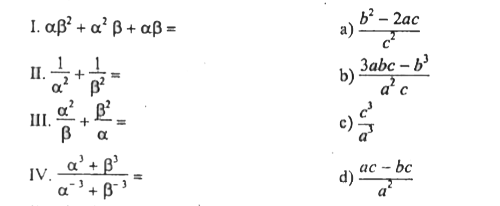a,b,c ∈Rα is a root of a2x2+bx+c=0β is a root of a2x2−bx−c=0 and γ is a root of a2x2+2bx+2c=0 thenSolution in Telugu
A,B,C,D
B,D,C,A
A,C,B,D
D,B,A,C
The correct Answer is:B
Step by step video, text & image solution for a,b,c in R alpha is a root of a^2 x^2 +bx +c=0 beta is a root of a^2 x^2 - bx - c=0 and gamma is a root of a^2 x^2 + 2 bx + 2 c=0 then by Maths experts to help you in doubts & scoring excellent marks in Class 12 exams.
Topper's Solved these Questions
- BOOK - DIPTI PUBLICATION ( AP EAMET)CHAPTER - QUADRATIC EXPRESSIONSEXERCISE - EXERCISE 2 ( SPECIAL TYPE QUESTIONOS ) ( SET -3)4videos
QUADRATIC EXPRESSIONS
- BOOK - DIPTI PUBLICATION ( AP EAMET)CHAPTER - QUADRATIC EXPRESSIONSEXERCISE - EXERCISE 2 ( SPECIAL TYPE QUESTIONOS ) ( SET -4)4videos
QUADRATIC EXPRESSIONS
- BOOK - DIPTI PUBLICATION ( AP EAMET)CHAPTER - QUADRATIC EXPRESSIONSEXERCISE - EXERCISE 2 ( SPECIAL TYPE QUESTIONOS ) ( SET -1)4videos
QUADRATIC EXPRESSIONS
- BOOK - DIPTI PUBLICATION ( AP EAMET)CHAPTER - PROPERTIES OF TRIANGLES EXERCISE - EXERCISE 2 (SPECIAL TYPE QUESTIONS) Set-410videos
PROPERTIES OF TRIANGLES
- BOOK - DIPTI PUBLICATION ( AP EAMET)CHAPTER - RELATIONSEXERCISE - Exercise49videos
RELATIONS
Similar Questions
IF α,β are the roots of ax2+bx+c=0 then the match the following
 01:48View Solution
01:48View SolutionA: The quadratic equation having roots 3±2I is x2−6x+13=0
R : the quadratic equation having roots α,β is x2−(α+β)x+αβ=005:19View SolutionI : If (aα+b)2+(aβ=b)−2=1 where α,β are the roots of ax2+bx+c=0 then ac(ac+2)=b2
II : the value of 'a' for which one root of the quadratic equation (a2−5a+3)x2+(3a−1)x+2=0 is twice as large as the quadratic equation04:00View SolutionA: In a ΔABC, if the sides a,b,c are in A.P. then acos2C2+ccos2A2=3b
R: In a ΔABC, if A,B,C are in A.P. then B=π/305:12View SolutionIf A ={1,2,3},B={x,y} then A×B=
01:49View SolutionIf alpha. beta are the roots of x^(2)+bx+c=0 and alpha+h,beta+h are the roots of x^(2)+qx+r=0 then h=
04:59View SolutionIf ax^(2)+bx+c=0 has alpha as its roots and -ax^(2)+bx+c=0 has beta as its roots then (a)/(2)x^(2)+bx+c has a
05:12View SolutionIf alpha,beta are the roots of the equation ax^(2)+bx+c=0 then the roots of the equation (a+b+c)x^(2)-(b+2c)x+c=0 are
02:26View SolutionSuppose α,β are roots of ax2+bx+c=0 and γ,δ are roots of Ax2+Bx+C=0.
If a,b,c are in GP as well as α,β,γ,δ are in GP, then A,B,C are inView SolutionIF α,β are the roots of x2+bx+c=0 and α+h,β+h are the roots of x2+qx+r=0 then h=
07:30View Solutiona,b,c ∈Rα is a root of a2x2+bx+c=0β is a root of a2x2−bx−c=0 and γ is a root of a2x2+2bx+2c=0 then
02:38View SolutionIf α,β,γ are roots of x3+ax2+bx+c=0 then ∑α2β =
05:07View SolutionLet a, b,c in R and a ne 0. If alpha is a root of a^(2) x^(2) + bx + c = 0 , beta is a root of a^(2) x^(2) - bx - x = 0 and 0 lt alpha lt beta . Then the equation a^(2) x^(2) + 2 bx + 2c = 0 has a root gamma that always satisfies :
06:44View SolutionLet a, b, c be real number (a≠0). If α is a root of a2x2+bx+c=0,β is a root of a2x2−bx−c=0 and 0<αβ, then the root of the equation (say γ) a2x2+2bx+2c=0 always satisfies
04:38View SolutionSuppose α,β are roots of ax2+bx+c=0 and γ,δ are roots of Ax2+Bx+C=0. If a,b,c are in GP as well as α,β,γ,δ, then A,B,C are in:
01:51View Solution

